
News from the Farmer-Driven Northern New York Agricultural Development Program
Following written protocols helps prevent and reduce calf health issues
Northern N.Y.; February 11, 2019. Dairy calf health research funded by the farmer-driven Northern New York Agricultural Development Program and conducted by Cornell University Cooperative Extension dairy specialists demonstrates the value of keeping good calf health records and following proper calf management and, when needed, treatment protocols.
In 2018, Cornell Regional Dairy Specialist Kimberley Morrill, Ph.D., worked with eight dairy farms in Northern New York to analyze dairy calf treatment protocol impact on calf health and costs. With assistance from Cornell PRO-DAIRY Dairy Herd Health and Management Specialist Robert Lynch, Morrill collected and analyzed more than 6,200 on-farm treatment records for non-lactating dairy heifers from birth to calving on eight Northern New York dairy farms.
The data analysis included age and treatment by illness, treatment frequency, farm compliance with established protocols, and standardized drug cost per animal per event and in total for the eight-month study period from January 1 to August 31, 2018. Written on-farm protocols were followed to treat 91.64 percent of the illnesses over the eight-month period.
“Following best management practices that have been developed with the herd veterinarian and other consultants to prevent and reduce calf health issues from ear infections to respiratory illness early in life positively impacts calf growth, future milk production, and farm costs. This type of research supports opportunities to enhance animal welfare, farm efficiency and consumer confidence in dairy products,” said Morrill.
This research builds on previous projects evaluating the impact of environmental conditions, housing, ventilation and climate stress on calves on Northern New York dairy farms. Learn more on the Northern New York Agricultural Development Program website at www.nnyagdev.org.
An abstract of this research project has been submitted for consideration for presentation at the June 2019 meeting of the American Dairy Science Association (ADSA). ADSA featured Morrill’s NNYADP dairy research focused on reducing calf respiratory illness at its 2018 annual meeting.
Funding for the Funding for the Northern New York Agricultural Development Program is supported by the New York State Senate and administered by the New York State Department of Agriculture and Markets.
CLICK HERE to read the full NNYADP report on calf health protocols research

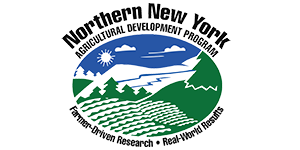 Other NNYADP research into the variable climate, environmental and farm management factors related to heat stress on dairy calves and cows is providing the basis for adapting best care practices for application farm-by-farm and by season. Learn more on the Northern New York Agricultural Development Program website at
Other NNYADP research into the variable climate, environmental and farm management factors related to heat stress on dairy calves and cows is providing the basis for adapting best care practices for application farm-by-farm and by season. Learn more on the Northern New York Agricultural Development Program website at 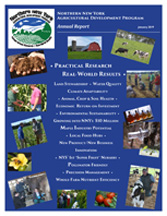 Northern N.Y.; January 9, 2019. The farmer-driven Northern New York Agricultural Development Program has posted its annual report at
Northern N.Y.; January 9, 2019. The farmer-driven Northern New York Agricultural Development Program has posted its annual report at 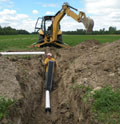 The NNYADP has commissioned a first-of-its-kind project for New York State. Miner Institute has begun evaluating how the use of tile drainage interacts with soil, crops, and water resources in a project located along Lake Champlain. The work includes a comparison of water quality and crop yield and quality from tiled and naturally draining fields.
The NNYADP has commissioned a first-of-its-kind project for New York State. Miner Institute has begun evaluating how the use of tile drainage interacts with soil, crops, and water resources in a project located along Lake Champlain. The work includes a comparison of water quality and crop yield and quality from tiled and naturally draining fields.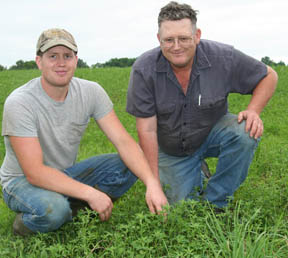 As evidence of the combined long-term commitment by New York State and the NNYADP to funding and finding a solution to the devastating alfalfa snout beetle, the annual report notes that the biocontrol application developed in NNY has not only restored alfalfa production regionally but is now finding use to manage pests in other crops across New York State and elsewhere in the U.S.
As evidence of the combined long-term commitment by New York State and the NNYADP to funding and finding a solution to the devastating alfalfa snout beetle, the annual report notes that the biocontrol application developed in NNY has not only restored alfalfa production regionally but is now finding use to manage pests in other crops across New York State and elsewhere in the U.S.
 Lake Placid, N.Y.: December 10, 2018 The Northern New York Agricultural Development Program has posted a research update with data to help maple and birch syrup producers respond to variable climate conditions.
Lake Placid, N.Y.: December 10, 2018 The Northern New York Agricultural Development Program has posted a research update with data to help maple and birch syrup producers respond to variable climate conditions.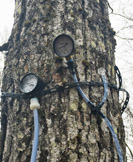
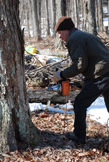 For maple producers, the report notes that early pre-season tapping of maple trees is competitive with tapping in mid-February.
For maple producers, the report notes that early pre-season tapping of maple trees is competitive with tapping in mid-February.